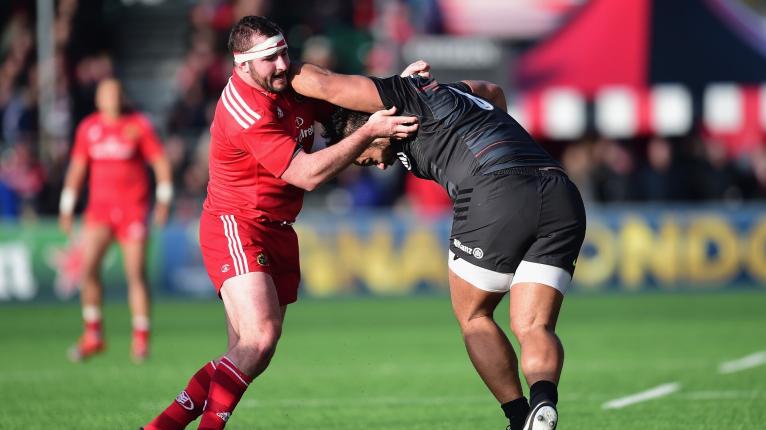The fatal IRFU systems flaw exposed by James Cronin's doping breach

Things couldn’t have worked out better for Munster and the IRFU regarding the curious tale of James Cronin and his slapstick doping violation. If ever there was a perfect week to bury the bad news this was it. In the old way of life, the bizarre case which the high profile Irish province made public on Monday would have run and run and caused a media/online storm, not died a very quick shrug-of-the-shoulders death in the sports reporting vacuum that currently exists due to the coronavirus pandemic.
In the old normal, we would have been smack bang in the business end of the season and Munster, who were due at arch-rivals Leinster last weekend, would not have Cronin available for the last month of the Guinness PRO14.
Deemed ineligible for a one-month period from April 15 to May 16 the loosehead would have missed four matches under normal circumstances, the derby in Dublin followed by Saturday’s trip to Limerick by Glasgow, a Murrayfield visit to face main conference rivals Edinburgh followed by another jump across the Irish sea, this time to take on the Scarlets in Llanelli.
Instead, with rugby around the globe indefinitely suspended and fans naturally preoccupied with the pandemic more than the game, the punishment meted out on April 15 – and only revealed by Munster five days later on April 20 – amounted to a meaningless slap on the wrist for an unintentional anti-doping rule violation that was the result of a third-party dispensing error by a pharmacy. ‘Nothing to see here, folks. Let’s quickly move on’ was the general reaction to the story, but its detail is too unusual to be so lightly dismissed.
Anti-doping cases are very infrequent at European level. The various domestic leagues – the PRO14, Top 14 and Premiership – are more likely to pick up on any breaches given there are just nine European weekends every year so for that fact alone, this Cronin incident is worth teasing out. Not since Matt Stevens’ cocaine bust way back in February 2009 have the European rugby authorities had to deal with an anti-doping case. Misconduct charges, citing and red cards are the usual run of the mill fare.
Munster Rugby and @IrishRugby have issued a statement following the EPCR disciplinary decision in relation to James Cronin.
CEO Ian Flanagan said: “This has been an extremely challenging time for James and the province, and we are glad it has reached its conclusion."
More ??
— Munster Rugby (@Munsterrugby) April 20, 2020
Then there is the Munster aspect to this. Not since Frankie Sheahan got himself in all sorts of bother further back in 2003 after a medic failed to tick the correct box on a therapeutic use exemption form for an asthma inhaler has the province had a doping case to answer at Heineken Cup level. Sheahan was initially banned for two years for high levels of salbutamol in a urine sample given following a semi-final loss at Toulouse. It took a seven-hour appeal hearing to get that punishment reduced to three months, freeing him to feature for Ireland at that year’s World Cup in Australia.
Now, 17 years later, we were back in the realms of another absence of a player therapeutic use exemption. Cronin’s career has never generated much headlines. A 29-year-old capped three times off the Ireland bench by ex-boss Joe Schmidt, 66 of the prop’s 124 appearances for Munster, whom he is contracted with through to summer 2021, have been as a replacement, dating back to an April 2013 debut versus Leinster. He is a popular fella on the terraces despite this regular back-up role, an old-school dog of a hard Munster forward who leaves it all out there whenever he gets his chance.
Now, though, he has been given a prominence for all the wrong reasons. Feeling unwell prior to a match versus Racing 92 which ended in a draw (the game where the visiting Finn Russell dramatically nutmegged Rory Scanell), he was prescribed the antibiotic, Amoxicillin, by Munster team doctor Jamie Kearns, who made dubious headlines last December for sparking an Allianz Park brawl following a verbal altercation with Saracens’ Jamie George.
When Cronin visited the pharmacy he was dispensed medication that was allegedly intended for another customer. The result? Prednisolone and prednisone – corticosteroids – were found in his sample, substances he had no permission to use. What followed was a drawn out saga. It wasn’t until February 19, 88 days after the match in Limerick, that EPCR formally issued their notice of charge against Cronin. Another 56 days were to pass before judgement was eventually handed down. All in, a not inconsiderable 144 days from pillar to post during which Cronin continued to play matches, making six appearances, two coming in the December European games versus Saracens.
This passage of time made the five-page EPCR verdict compulsory reading, its investigation and decision set out in 29 sub-sections by Anthony Davies, the single legal member of the disciplinary panel. That was, of course, once you eventually found the written decision on the European Cup own website.
The news section of the tournament’s official website made no mention of the Cronin decision, instead focusing on semi-final nostalgia and advertised a Champions Rugby Show podcast featuring Jamie Heaslip, the retired Leinster and Ireland player who had his own scrape with doping headlines last autumn when an incident recounted in his autobiography didn’t factually stand up to scrutiny and resulted in a clarification issued via his publisher.
Paul Kimmage: 'Jamie Heaslip has finally spoken… but forgive me if I was expecting more'
https://t.co/G9ZJvPrRVV pic.twitter.com/RXn5MVhnZY— Irish Independent (@Independent_ie) November 4, 2019
Despite two bits of information being redacted – one concerning the probable identity of the pharmacy, the other regarding the labels on the product packaging – the devil of the detail in Cronin’s escapade should worry players the world over. While the prop was essentially exonerated in that he is now serving a short ban where he won’t miss any games, it was still determined that he bore at least some fault for the violation after he was dispensed two medications, Germentin (a trading name for Amoxicillin) and Prednesol 5mg tablets, of which he took nine – five in one dose and four in another – before the match.
That he landed in bother for unwittingly taking the banned Prednesol should concern his contemporaries given how rugby players, by their nature, are effectively institutionalised during the career, living their lives to a very detailed structure handed down by their clubs and told what they can and can’t do. There are intrinsically not allowed to think for themselves so when Cronin was prescribed drugs, he understandably took the prognosis in good faith.
For a sport that tries so very hard to pride itself on its anti-doping message amid whispers that rugby isn’t entirely as clean as it perceives itself, the calamity that subsequently unfolded for Cronin begs the question why an organisation such as the IRFU relies on a third party – busy pharmacies local to its players around Ireland – to dispense medicines?

Reading the Cronin verdict, the IRFU should really consider taking these third parties out of the equation and set up their own in-house pharmacy to administer the various legally prescribed drugs to players. That way they take control, safeguarding players by not having them venture outside their rugby bubble to deal with busy people working in pharmacies who can – as evident here – make unexpected mistakes that have awkward consequences.
This outside link was Cronin’s downfall, Davies’ verdict outlining how the player didn’t have a copy of the prescription that had been emailed by the Munster team doctor to the pharmacy. Instead, he just collected what he was given over the counter after he said who he was, never questioning why on this occasion there were two sets of medication and not just one as was the case when previously prescribed Amoxicillin.
The verdict suggested that Cronin should have been of a mind to google Prednesol, the second medicine he had been given, before taking it as it would have revealed it is prohibited in sport at certain times. Thing is, how often do players – particular 24 hours before a match – ever take these matters into their own hands given how institutionalised they are and reliant on the advice of the experts involved with their teams? Rarely, you’d imagine.
Despite a virtuoso display by Finn Russell, Racing 92 left Limerick with a draw as Munster refused to accept defeat…
?? Munster 21-21 Racing 92 ??
All the action from a #HeinekenChampionsCup cracker at Thomond Park ? pic.twitter.com/ATUr3TzhWI
— Rugby on TNT Sports (@rugbyontnt) November 24, 2019
“I have sympathy for the player in this case,” wrote Davies. “While the violation could have been avoided had the player put better safeguards in place, it is clear the player’s violation was the result of a very serious (and unexpected) mistake by a pharmacy. The player saw his name on the product packaging and understandably assumed that it was the medication prescribed to him by his team doctor. He had obtained medication prescribed by his team doctor at the same pharmacy previously without issue. Therefore, it was a careless but understandable mistake… I’m of the view that the player’s level of fault was low.”
Low, but enough all the same to land Cronin in a whole heap of unnecessary trouble where the focus now rests on Munster and the way they go about medicating their players in the future.














































































